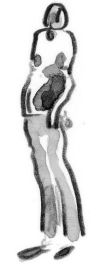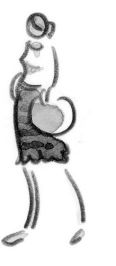Ridiculous/Hilarious/Terrible/Cool (31 page)
Read Ridiculous/Hilarious/Terrible/Cool Online
Authors: Elisha Cooper

A fortune-teller in Pakistan told Aisha she would marry at twenty-six. Her father just wants her to have children, and has been joking that he would take care of them. Aisha thinks she'll go to law school, though sometimes she plays with the idea of art school.
Over the holidays, she walked into the Abercrombie & Fitch store near the Shaikhs' home in Chicago and was offered a job. She had the
look
. Ethnic, pretty. The
new
look, actually. The company has been hiring diverse-looking salespeople to join their blond-looking salespeople (a lawsuit has been helping them). They want their workers to look American, but what is that?
look
. Ethnic, pretty. The
new
look, actually. The company has been hiring diverse-looking salespeople to join their blond-looking salespeople (a lawsuit has been helping them). They want their workers to look American, but what is that?
So Aisha has a temporary job at Abercrombie & Fitch. She finds the whole thing hilarious.
Zef Calaveras took a course in DJ-ing over the summer. It was a fun time. For the final project the students compiled a complete set of house music.

Zef has been playing with his mixing board until midnight on most nights. He sleeps better than he did before, though sometimes he doesn't. He's been taking Ambien, but he just ran out and needs to refill his subscription.
Zef hasn't been late to school this year.
After classes at Truman, Zef spends his free time listening to music on his Nano. Its inferior warranty is “ridiculous. ” He has a new cell phone, which he found in a taxi. He hasn't changed the ring tone from that of its previous owner.
Zef has a new tan jacket he bought for seven dollars at a thrift store. He also has a new keychain, and longer sideburns. He has the same floppy hair and pillowy good looks. His skin is clearer. His allergies aren't as bad.
The girl he liked named Daisy disappeared. He hasn't met anybody else. His girlfriend from Payton dropped out, and transferred to Truman. They don't talk.
Zef won't graduate from high school in the winter as planned, but he hopes to graduate in June. Next year he wants to attend Columbia College, a small arts college in Chicago that specializes in media and technology.
Zef's favorite drink is still the six shot, half-decaf, no water, iced venti Americano.
Anais Blake did not end up going to college. After a summer of working at the local Italian ice place (“The worst thing a dancer could have done!”), she flew to Miami to study with the Cuban Classical Ballet. She had been going there over the summer to work with their instructor, and when the time came for Anais to head to Indiana, she decided she needed to concentrate entirely on her dancing.
It's been intense. She dances with the company from ten in the morning into the evening. Her ankles are okay, though she's often sore. The only day she does not dance is Sunday. In her spare time she swims, though not at the beach.

It was more intense at the beginning, when Anais lived in the instructor's house with the other dancers: everyone watching dance videos when they weren't dancing, noting what everyone else was eating. Anais even went on a diet.
So she moved into her own apartment with another dancer, a fifteen-year-old. Anais is sort of taking care of her. They go grocery shopping in Anais's air-conditionless Toyota. The other dancers in the group are skilled, but young. They ask Anais what high school was like. That she went to high school is something they find exotic.
It has been hard not having her family around. There are no friends to talk to, no one to date. She's been lonely.
In October, Anais flew to New York and visited Maya. She had a wonderful time. Maya's roommates were fun. Anais talks with Maya on the phone often, and feels they may be even closer now.
Her plan is to audition for the Joffrey Ballet, and other ballet companies, in the spring. Anais wishes she could have jumped from high school straight into a professional company, but she feels that the instruction she's getting now is preparing her to make that leap. She says, “I want to do this. I want to dance.”
Anais could still enroll in Indiana. In dance, things change fast. A few months from now Anais could be anywhere.
Anthony Johnson Jr. went out for the football team his senior year at Payton. He wasn't allowed to play in the first games because of barely passing grades from his junior year, and when he played he didn't play much. He backed up on defense.
One play from the season stood out.
Late in some loss, the other team ran a reverse. As Anthony chased the runner, one blocker hit his legs, another slammed into his chest. He was pancaked, and missed the tackle. He remembers lying on the ground, looking up at the blue sky. But then he got up and kept running. His hip hurt for weeks afterward, but he says, “I never quit.”

Something changed in Anthony over the summer. He saw there were two roads in front of him. One was the spiraling road he was on, the other a more focused road he was not on. Anthony decided to take the focused road. The structure of football practices helped. He had to show up every day. He couldn't go two days one week, three the next. He also had a job over the summer, working in an “intern situation” at the community paper in his neighborhood.
“I'm not a completely different person. I'm still me,” Anthony says. He still hangs out at the back of the cafeteria, in the same seat, in fact. His grades are still bad, though better than before. He worries about graduating. But his perspective has changed, sometimes in small ways. Because he's on the football team, he now knows boys who are white and says hello to them in the halls.
Another development is that The Girl is no longer at Payton. She gave birth to twins. She calls Anthony and asks him to take her out, but he's not interested.
He says he's no longer smoking, that he quit dealing drugs. He got his iPod back and he's waiting for a cell phone. On the weekends he's been driving his mother's Mustang. His mustache is thicker, his voice deeper. He has a new black winter coat.
With his mother's help, Anthony wrote down a list of goals. At its top was:
Live a comfortable life
. Other goals were to work hard, be on time, graduate. Anthony is applying to black colleges in the South, some smaller colleges in Illinois.
Live a comfortable life
. Other goals were to work hard, be on time, graduate. Anthony is applying to black colleges in the South, some smaller colleges in Illinois.
He thinks that last year he put everything else in his life in front of school. The Girl, the drugs, the getting caught with drugs, the clowning around in the cafeteria. “Never did more than was necessary,” he says.
But things changed. He says he's trying to stay calm-headed. All in all, he's having an okay time in his senior year of high school.
ACKNOWLEDGMENTS
First and foremost, thank you to the eight students: Daniel, Emily, Maya, Diana, Anais, Aisha, Anthony, and Zef, for letting me tag along and ask questions about their lives even as they unfolded. Their openness made this book possible. Thanks also to the rest of the student body, for tolerating a guy with a sketchbook hanging around their hallways and classrooms.
Thanks to Sam Dyson and Ken Mularski, whose help in getting this project off the ground was pivotal, and whose guidance throughout was essential. Thank you to Eileen Murphy for the same. I have a great deal of gratitude for the entire Payton community, from the security officers at the front desk to principal Gail Ward, for the kindness they showed me all year.
This book had many readers. My thanks to Austin Bunn, Janice P. Nimura, and Barney Latimer for the care they brought to the text. Thanks also to Kevin Delaney, Jordan Henry, Joshua Spanogle, Mark Holtzen, Clark McKown, Carey Bartell, and Josh Gilbert, for their comments and their high school reminiscences (or was that dread?).
Thank you to my editor, Lauri Hornik, both for the initial idea, and for the patience in bringing it to fruition. Thanks to the art director Lily Malcom for her clear eyes, to Regina Castillo for her sharp copyediting, and to everyone in the Dial Books family.
Thanks, as always, to my agent, Liz Darhansoff.
Lastly, thank you to Elise Cappella, for the daily insight, for listening to all the stories I came home with. And to Zoë and Mia, you will be in high school someday, though not so soon.
Elisha Cooper went to high school in Connecticut, graduated from Yale, then worked for
The New Yorker
before becoming a writer and illustrator. He is the author of the memoir
Crawling: A Father's First Year
and many children's books, including
Beach
,
A Good Night Walk
, and
Dance!
which was a
New York Times
Ten Best Illustrated winner.
The New Yorker
before becoming a writer and illustrator. He is the author of the memoir
Crawling: A Father's First Year
and many children's books, including
Beach
,
A Good Night Walk
, and
Dance!
which was a
New York Times
Ten Best Illustrated winner.
Elisha lives in New York City with his wife and two daughters.
Other books
The Taylor County War by Ford Fargo
A Fashionable Murder by Valerie Wolzien
Chill Factor by Stuart Pawson
Life or Death by Michael Robotham
Kisses for the Billionaire: Final Kiss by M. G. Morgan
Miss Grantham's One True Sin (The Regency Matchmaker Series Book 2) by Melynda Beth Andrews
A Passionate Discovery (Self-Discovery Series) by Brooke, T
Golden Daughter by Anne Elisabeth Stengl
The Mysterious Case of Mr. Strangeway (The St. Croix Chronicles) by Cooper, Karina
A Home for Jessa by Robin Delph